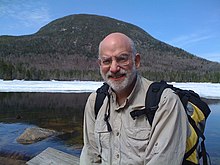Gregory Chaitin | |
|---|---|
 Chaitin in 2008 | |
| Born | 25 June 1947 |
| Nationality | Argentine-American |
| Known for | |
| Scientific career | |
| Fields | |
| Institutions | |
| Website | uba |
Gregory John Chaitin (/ˈtʃaɪtɪn/ CHY-tin; born 25 June 1947) is an Argentine-American mathematician and computer scientist. Beginning in the late 1960s, Chaitin made contributions to algorithmic information theory and metamathematics, in particular a computer-theoretic result equivalent to Gödel's incompleteness theorem.[2] He is considered to be one of the founders of what is today known as algorithmic (Solomonoff–Kolmogorov–Chaitin, Kolmogorov or program-size) complexity together with Andrei Kolmogorov and Ray Solomonoff. Along with the works of e.g. Solomonoff, Kolmogorov, Martin-Löf, and Leonid Levin, algorithmic information theory became a foundational part of theoretical computer science, information theory, and mathematical logic.[3][4] It is a common subject in several computer science curricula. Besides computer scientists, Chaitin's work draws attention of many philosophers and mathematicians to fundamental problems in mathematical creativity and digital philosophy.
- ^ Gregory Chaitin (2007), Algorithmic information theory: "Chaitin Research Timeline" Archived 23 March 2012 at the Wayback Machine
- ^ Review of Meta Math!: The Quest for Omega, By Gregory Chaitin SIAM News, Volume 39, Number 1, January/February 2006
- ^ Calude, C.S. (2002). Information and Randomness: An Algorithmic Perspective. Texts in Theoretical Computer Science. An EATCS Series. Springer-Verlag.
- ^ R. Downey, and D. Hirschfeldt (2010), Algorithmic Randomness and Complexity, Springer-Verlag.